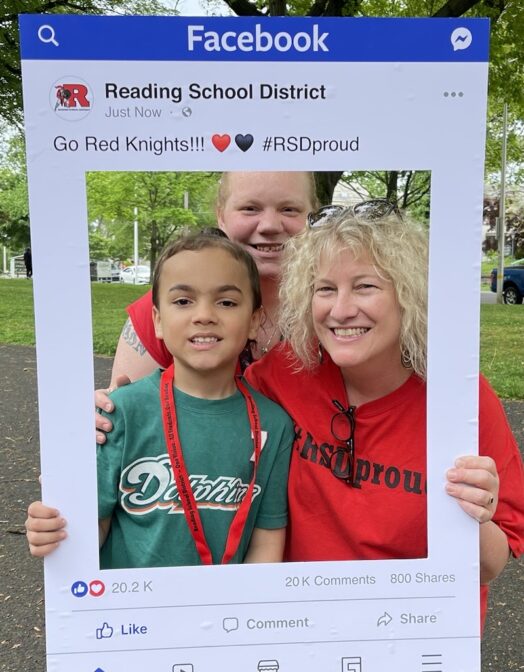
Reading School District's Administration Building
Jeremy Long / WITF

Reading School District's Administration Building
Jeremy Long / WITF

Jeremy Long / WITF
Reading School District's Administration Building
The largest school district in Berks County – and the 4th largest in the state – will have two newly elected school board members starting this year.
Reading School District is a majority-Latino district that serves more than 17,800 students, many of whom come from high-poverty areas. According to the district site, 93% qualify for free or reduced-price lunch. A quarter are English Language Learners.
Melissa Eggert and Shaykayarira Delrio-Gonzalez, who were elected for 4-year terms in November, are lifelong residents of Reading who graduated from Reading High School. While their backgrounds are different, both are well-acquainted with some of the most pressing issues facing the district.
Tackling youth violence and building better relationships with the district’s Spanish-speaking families are top priorities for the new school board members.
Here is how they plan to make an impact.
Shaykayarira Delrio-Gonzalez
Delrio-Gonzalez’s life was turned upside down when her oldest son, Francisco Soto Jr., was shot and killed in the streets of Reading at the age of 17 by a 26-year-old. She had spent the entire day with him before she left for a trip to Philadelphia.
“It was tragic that day,” Delrio-Gonzalez said, “We laughed like crazy. We had an amazing day, until 5:30 in the afternoon that I closed the door and never saw him again. “

Photo courtesy of Shaykayarira Delrio-Gonzalez
Shaykayarira Delrio-Gonzalez
While Delrio-Gonzalez fights to hold her son’s alleged killer accountable, she is fighting another battle from the opposite side. Her younger son, now 19, was charged with murder in 2022 and is trying to fight the charges in court.
Despite the difficult times and tragic events in Delrio-Gonzalez’s life, she still felt she wanted to make an impact by running for school board. With one child lost to gun violence and another accused of a violent crime, Delrio-Gonzalez plans to use those experiences to inform her service on the board.
“I didn’t want another parent to feel the pain that I feel. I wanted to bring awareness to make sure that we create a safer environment for our youth,” Delrio-Gonzalez said. “I realized that there was a need to have a face in everyday life. Unfortunately, this gun violence is something that is very foreseen throughout the city.”
Delrio-Gonzalez, born in Mayaguez, Puerto Rico, has lived in Reading since the age of 14. She graduated Reading High School in 1994 and went on to study nursing. She works at Tec Centro.
As a member of the school board, Delrio-Gonzalez said, she will advocate for anti-bullying policies as part of a larger goal of addressing violence between students. Many times, she said, students will seek protection from bullying by joining gangs.
She also wants to help parents see that they have a voice in school issues, especially parents in immigrant families who do not speak English and often do not see value in going to school board meetings. Delrio-Gonzalez said she wants to strengthen trust among immigrant families and parents who prefer to remain under the radar because of their immigration status.
“Because they’re not aware of their legal rights. As an immigrant, it affects their children in the fact that they don’t go to the meetings. They don’t ask questions at the schools. They don’t request guidance,” Delrio-Gonzalez said.
The key to empowering and fostering trust among parents is by listening, she said. While she acknowledges the district has been holding more town halls and other events to engage and listen to the community, she thinks the district could be doing more of that.
“I just want to make sure we continue to do those town halls, we continue to show the community that we are listening to them, and that we’re here for them, and we want to collaborate with them, so a lot of community education,” Delrio-Gonzalez said.
Melissa Eggert
Melissa Eggert has lived in Reading all her life and also graduated from Reading High School. She worked as a teacher for 34 years, first as a fifth grade teacher, later as a reading coach and, eventually, as a professional development facilitator for literacy. Eggert retired from the district last year. Based on her experience working with students, she already has a wealth of ideas on how the district could better serve students. One of them is to improve the quality and consistency of resources and support for all special education students and ESL learners.

Photo courtesy of Melissa Eggert
Melissa Eggert
“I think it’s been a challenge to get regular ed, special education, and ESL all working together. In some of the buildings it does, but with a district with 19 buildings, it’s hard to build consistency, Eggert said. “That’s something throughout my career, I’ve tried to assist with in different positions.”
Eggert believes part of the solution is to empower Spanish-Speaking parents to use more English at home and practice with their children.
Eggert also wants to develop better programs or policies to address the district’s large transient population. Students living in families with unstable living arrangements, often renters, change school frequently. That constant change, Eggert said, can have negative mental health impacts on students.
She also wants to continue supporting programs that assist homeless students. The district has a program called the Knight’s Closet, a place where students can access clothes, school supplies and hygiene products.
According to Pennsylvania Department of Education data for the 2021-2022 school year, there were more than 800 Reading School District students experiencing homelessness.
Teacher retention is another main priority.
As a former teacher herself, Eggert said she “would like to see Reading be a district that everybody wants to teach in.”
She said she has seen how high turnover can be a challenge for implementing policies and new initiatives.
“Once you get an initiative going with staff, then all of a sudden, you’ve got maybe 10 new teachers in a building out of 40 positions, and that’s a challenge when you’re constantly turning over your teaching population as well,” Eggert said.
The days of journalism’s one-way street of simply producing stories for the public have long been over. Now, it’s time to find better ways to interact with you and ensure we meet your high standards of what a credible media organization should be.